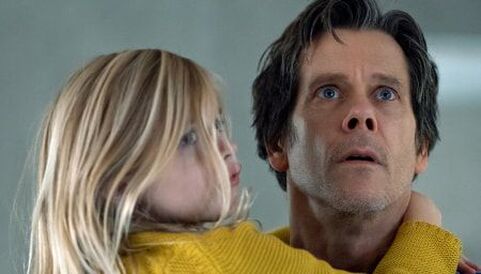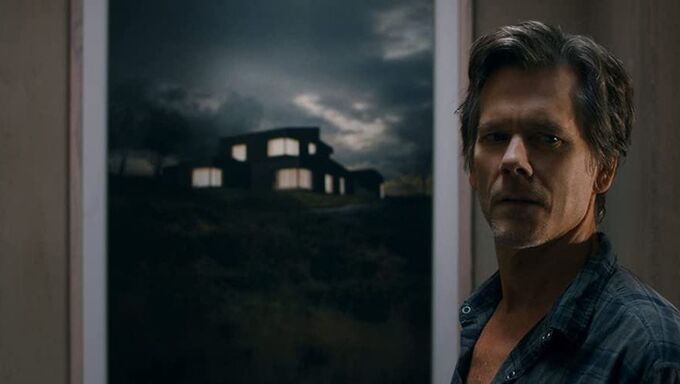[Review] 'You Should Have Left' Keeps the Audience Staying with an Intriguing Haunted House Story6/18/2020  “Violent or upsetting dreams are merely the minds attempts to release the pressures of our daily thoughts and fears. As you learn to meditate you will discover your mind is very difficult to silence. If you try to stop your thoughts or prevent them from entering your mind, you will only create conflict when you are trying to achieve peace..." ...When in an unfamiliar place or even your own home, once night falls the blackness raises a question: what is real and what is a shadow? A shadow presents a distorted version of us which became manipulated by light and angles. A shadow can also be a memory, showing what remains just out of reach or just out of sight. Some shadows bring joy, but others bring fear as images reveal grotesque shapes made of darkness. Blumhouse Production’s and Universal's newest release ventures into this bleakness with an engaging and creepy thriller. You Should Have Left (Du hӓttest gehen sollen) started as a 2017 novella by Daniel Kehlmann and was translated by Ross Benjamin. More recently David Koepp (Secret Window, Stir of Echoes) wrote the screenplay, directed the 2020 movie, and brought together such talents as genre-star Kevin Bacon (Tremors, The Following (TV show)), along with Amanda Seyfried (Jennifer’s Body, Mama Mia), and Avery Tiiu Essex (Modern Family). You Should Have Left jumps into the nightmares right away by letting the viewers know at night no one is safe, and all secrets come to the surface. However, by day we see a beautiful family in a wealthy home filled with everything money can buy and topped off with a large amount of love and happiness. Susanna (Seyfried), a young actress, is married to Theo (Bacon), a rich retired husband with a secret. The film heavily hints at Theo’s past because it not only makes him recognizable (in the bad way), but people also associate his name with danger. Theo understands his bad reputation and growing jealousy puts a strain on his family, so he suggests time away from the world and all the attention. So, Theo, Susanna, and their six-year-old daughter Ella rent “a place to relax and contemplate, a simple sanctuary in picturesque Wales.” Another character who (kind of) never makes an appearance but plays an integral part in the film is the mysterious Stetler: the apparent owner of the house. The enigmatic proprietor remains aloof as neither spouse has ever met nor spoken to the man. However, the creepy townspeople seem very interested in how the family came across the house and want to know about Stetler or any happenings, which further confuses and even irritates Theo. Already on edge, the husband actively seeks peace, but just finds more questions and insecurities. And after just one night in the house, too many secrets come out and the previously happy family starts either snapping at each other or communicating only through silent stares. At first, the angular and labyrinth qualities of the house impresses and delights the family, but at night the never-ending rooms become a dizzying trail of light and shadows. Cinematographer Angus Hudson uses the color and the framing of the rooms as a technique to enhance the confusion. Stark and sudden shifts in color and lighting distinguish which parts of the house are normal and which parts physically cannot exist. The changing styles of the interior and the constant growing or disappearing rooms make for some intense architectural oddities which become strongly reminiscent of the book House of Leaves. Furthermore, the physicality of the madness becomes depicted in the shadows and ever-changing rooms. The cold bland hallways lined with several doors and the spiral staircase with a single bare swinging lightbulb add to the structural uniqueness of the setting. According to Stephen King, the most fearful moments of a film or book do not come from the monster, but from the audience’s connection and reaction to the characters. The monster in You Should Have Left presents as a house which lures in its perfect prey; however, the characters create the driving force behind the creepiness. All three of the cast members play their parts believably, and all create convincing relationships as their interactions and rapport demonstrate a powerful familial chemistry. Both adult actors (especially Bacon) present touching parental moments which range from humorous to fearful. Within the house, Theo provides the point of view of the story as each room becomes uncovered and as he wanders further into the house, we also gain the perspective of the character’s slow release from sanity. Bacon also brings a strong visual performance when his character’s past and present start overlapping, and the house begins distorting realities and nightmares. Bacon’s experience with horror dates back to the 80s so he’s proven his expertise in the genre, but even at a young age, Avery Tiiu Essex steals some scenes from the veteran horror actor. A rarity in horror films is a child actor who is not annoying, so Essex’s performance really stands out against several movies over the last few years. She plays a very inquisitive child who loves learning secrets, so her family and the new dwelling allows for the character to really demonstrate the adaptability and even danger which comes from innocent curiosity. The young actress fulfills the emotional role of the character very well, plus the childish naiveté allows her to see beyond the secrets. The daughter also holds a unique position in the film because not only does she possess a distinct insight into the emotions of people around her, but she becomes the outlet for most of the movie’s exposition. The viewers learn about the past through stories told to Ella, so the audience learns about death, betrayal, and family secrets through a childlike lens. No matter the location, evening becomes associated with shadows and nightmares. While awake even familiar surroundings hold secretes hidden beneath the darkness, and when asleep the mind casts its own shadows created from memories. A haunted house filled with dark passages and secret rooms represents a mind losing a connection to reality. You Should Have Left combines strong characters and creepy cinematography for an effective haunted house story. Some questions may go unanswered and fans of the book might disagree with the different approach to the material but embrace the psychological aspects of the film and accept the claustrophobic atmosphere of the house. Just turn off the lights and let yourself get lost in the shadows. You Should Have Left is now available through On Demand. By Amylou Ahava
0 Comments
Leave a Reply. |
Archives
March 2023
|


 RSS Feed
RSS Feed